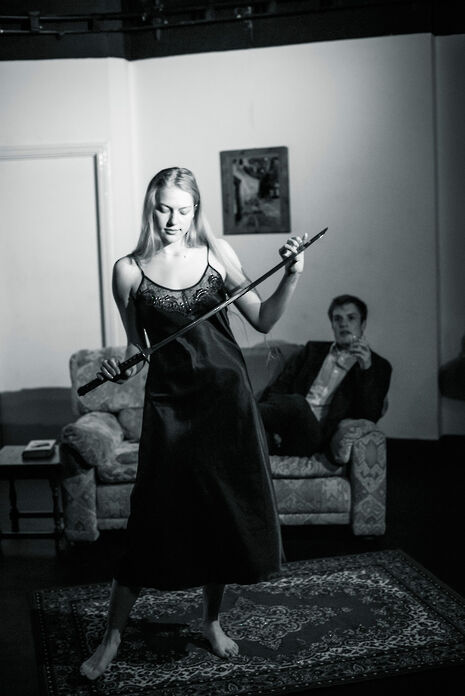A Severed Head
Millie Foy and Nick Ash are satisfied with this soundly directed, well acted farce

We were promised sex, sophistication and a samurai sword from this week’s Corpus production A Severed Head; we even dared to hope for the actual said head to appear. It didn’t, despite the appearance of a suspicious package, but we certainly managed to cross the other items off our list. We also learned a lot about wine.
Emer O’Hanlon’s direction was largely sound. The notoriously awkward Corpus space was used effectively; the simple set worked well and the flipping over of the framed photo to differentiate the settings was a subtle, lightly humorous device. The main issue was pacing. The play itself hurtles along at a terrifying rate; clearly time flies when you’re a ‘wild goose’, chasing your wife from one London living room to another strikingly similar one. However, though the scene changes were clearly well rehearsed, it felt on occasion that the play wasn’t given enough time to breathe before the lights were dimmed and we were off again. For instance, we couldn’t process the shock of the unexpected contents of Martin’s parcel (unfortunately, not a severed head) before being plunged into darkness. Unfortunately, this short-circuiting recurred throughout.
A Severed Head had several bright stars. The three female actors were impeccably cast. Bethan Davidson (Antonia) was enchanting. Sprawling all across the stage, patting everyone’s knee, succeeding in making us all her ‘darling’ in that lovely, typically '60s, English upper-middle-class way. Matilda Wickham (Honor) and Isla Iago (Georgie) both put in stellar, consistent performances too. Iago provided an engaging, complimentary, contrast to Davidson’s Antonia. This made more believable the significant age gap between their characters. Wickham also offered us a distinct and well developed character. Her portrayal of Honor was crisp and rational, sustaining an ambiguity between threatening and alluring.
The men. Here performances were more varied. The role of Martin is challenging. Present throughout the entire play, Adam Butler-Rushton had the weighty responsibility of setting the pace and tone for the piece. In general, he relaxed into the part of the naïve and somewhat petulant Martin as the play progressed, despite a less than convincing start. One feels the play would have benefited from a more charismatic performance from Butler-Rushton, less rabbit in the headlights, more flawed middle-aged wine merchant. However, by the end, he had synced up with the comic timing of the play, and started reaping in more laughs. Sam Pulman-Slater’s Palmer, the American psychoanalyst, drew the most audience laughter. His accent was consistent and his presence on stage always enjoyable. The direction of Rufus McAlister as Alexander was perhaps the play's most noticeable directorial flaw; the character was played more uncle-priest than Casanova-sculptor.
All in all, a fine example of the coming together of Cambridge acting talent, though the farcical capacity of the play way not fully harnessed.
 Comment / Plastic pubs: the problem with Cambridge alehouses 5 January 2026
Comment / Plastic pubs: the problem with Cambridge alehouses 5 January 2026 News / Cambridge academics stand out in King’s 2026 Honours List2 January 2026
News / Cambridge academics stand out in King’s 2026 Honours List2 January 2026 News / Cambridge businesses concerned infrastructure delays will hurt growth5 January 2026
News / Cambridge businesses concerned infrastructure delays will hurt growth5 January 2026 News / AstraZeneca sues for £32 million over faulty construction at Cambridge Campus31 December 2025
News / AstraZeneca sues for £32 million over faulty construction at Cambridge Campus31 December 2025 Interviews / You don’t need to peak at Cambridge, says Robin Harding31 December 2025
Interviews / You don’t need to peak at Cambridge, says Robin Harding31 December 2025









